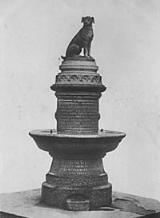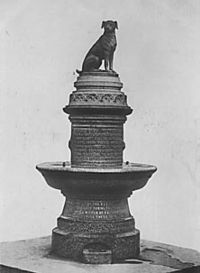
Cruelty to Animals Act 1876
Encyclopedia
The Cruelty to Animals Act 1876 was an Act
passed by the Parliament of the United Kingdom
(39 & 40 Vict., Public Acts, c. 77.) which set limits on the practice of, and instituted a licensing system for animal experimentation, amending the Cruelty to Animals Act 1849
. Its long title
was An Act to amend the Law relating to Cruelty to Animals (15 August 1876). The Act was replaced 110 years later by the Animals (Scientific Procedures) Act 1986
.
 The Act stipulated that researchers would be prosecuted for cruelty, unless they conformed to its provisions, which required that an experiment involving the infliction of pain upon animals to only be conducted when "the proposed experiments are absolutely necessary for the due instruction of the persons [so they may go onto use the instruction] to save or prolong human life". Furthermore the Act stated that should the experiment occur, the animal must be anaesthetised
The Act stipulated that researchers would be prosecuted for cruelty, unless they conformed to its provisions, which required that an experiment involving the infliction of pain upon animals to only be conducted when "the proposed experiments are absolutely necessary for the due instruction of the persons [so they may go onto use the instruction] to save or prolong human life". Furthermore the Act stated that should the experiment occur, the animal must be anaesthetised
, used only once (though several procedures regarded as part of the same experiment were permitted), and killed as soon as the study was over. Prosecutions under the Act could be made only with the approval of the Secretary of State
. The Act was applicable to vertebrate
animals only.
had led the government to set up a Royal Commission
on Vivisection in July 1875, which recommended that legislation be enacted to control it. This Act was created as a result, but was criticized by National Anti-Vivisection Society
— itself founded in December 1875 — as "infamous but well-named," in that it made no provision for public accountability of licensing decisions. The law remained in force for 110 years, until it was replaced by the Animals (Scientific Procedures) Act 1986
, which is the subject of similar criticism from the modern animal rights movement.
Such was the perceived weakness of the Act, that vivisection opponents chose, on at least one occasion — the Brown Dog affair
— to incite a libel suit rather than seek a prosecution under the Act.
Act of Parliament
An Act of Parliament is a statute enacted as primary legislation by a national or sub-national parliament. In the Republic of Ireland the term Act of the Oireachtas is used, and in the United States the term Act of Congress is used.In Commonwealth countries, the term is used both in a narrow...
passed by the Parliament of the United Kingdom
Parliament of the United Kingdom
The Parliament of the United Kingdom of Great Britain and Northern Ireland is the supreme legislative body in the United Kingdom, British Crown dependencies and British overseas territories, located in London...
(39 & 40 Vict., Public Acts, c. 77.) which set limits on the practice of, and instituted a licensing system for animal experimentation, amending the Cruelty to Animals Act 1849
Cruelty to Animals Act 1849
The Cruelty to Animals Act 1849 is an Act of the Parliament of the United Kingdom with the long title An Act for the more effectual Prevention of Cruelty to Animals. The Act repealed two previous Acts, the Cruel Treatment of Cattle Act 1822 and the Cruelty to Animals Act 1835, and reiterated the...
. Its long title
Long title
The long title is the formal title appearing at the head of a statute or other legislative instrument...
was An Act to amend the Law relating to Cruelty to Animals (15 August 1876). The Act was replaced 110 years later by the Animals (Scientific Procedures) Act 1986
Animals (Scientific Procedures) Act 1986
The Animals Act 1986 is an Act of the Parliament of the United Kingdom passed in 1986, which regulates the use of laboratory animals in the UK. The Act permits experiments to be carried out on animals, including procedures involving vivisection, if certain criteria are met...
.
The Act

Anesthesia
Anesthesia, or anaesthesia , traditionally meant the condition of having sensation blocked or temporarily taken away...
, used only once (though several procedures regarded as part of the same experiment were permitted), and killed as soon as the study was over. Prosecutions under the Act could be made only with the approval of the Secretary of State
Home Secretary
The Secretary of State for the Home Department, commonly known as the Home Secretary, is the minister in charge of the Home Office of the United Kingdom, and one of the country's four Great Offices of State...
. The Act was applicable to vertebrate
Vertebrate
Vertebrates are animals that are members of the subphylum Vertebrata . Vertebrates are the largest group of chordates, with currently about 58,000 species described. Vertebrates include the jawless fishes, bony fishes, sharks and rays, amphibians, reptiles, mammals, and birds...
animals only.
History & controversy
Opposition to vivisectionVivisection
Vivisection is defined as surgery conducted for experimental purposes on a living organism, typically animals with a central nervous system, to view living internal structure...
had led the government to set up a Royal Commission
Royal Commission
In Commonwealth realms and other monarchies a Royal Commission is a major ad-hoc formal public inquiry into a defined issue. They have been held in various countries such as the United Kingdom, Australia, Canada, New Zealand, and Saudi Arabia...
on Vivisection in July 1875, which recommended that legislation be enacted to control it. This Act was created as a result, but was criticized by National Anti-Vivisection Society
National Anti-Vivisection Society
The National Anti-Vivisection Society, is a national, not-for-profit animal welfare organization based in London whose purpose is to eliminate product testing, education and biomedical research on animals....
— itself founded in December 1875 — as "infamous but well-named," in that it made no provision for public accountability of licensing decisions. The law remained in force for 110 years, until it was replaced by the Animals (Scientific Procedures) Act 1986
Animals (Scientific Procedures) Act 1986
The Animals Act 1986 is an Act of the Parliament of the United Kingdom passed in 1986, which regulates the use of laboratory animals in the UK. The Act permits experiments to be carried out on animals, including procedures involving vivisection, if certain criteria are met...
, which is the subject of similar criticism from the modern animal rights movement.
Such was the perceived weakness of the Act, that vivisection opponents chose, on at least one occasion — the Brown Dog affair
Brown Dog affair
The Brown Dog affair was a political controversy about vivisection that raged in Edwardian England from 1903 until 1910. It involved the infiltration of University of London medical lectures by Swedish women activists, pitched battles between medical students and the police, police protection for...
— to incite a libel suit rather than seek a prosecution under the Act.
Penalties
The Act states, in part:External links
- Full text of the Act, accessed May 12, 2010.

